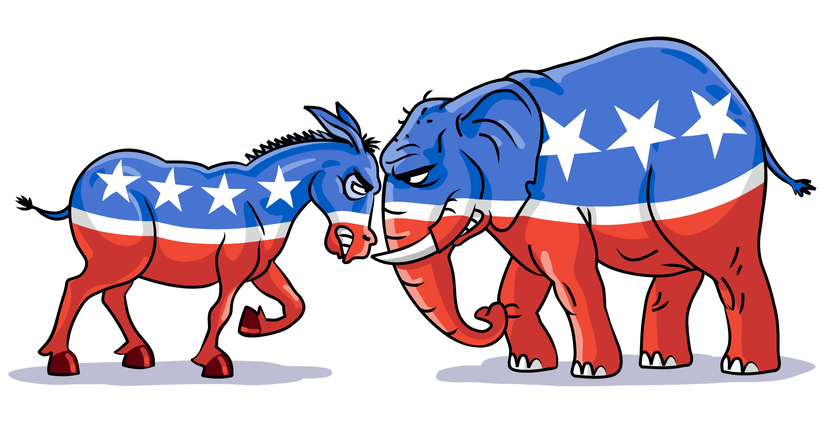Recently, the markets and economic data have been better than just about everyone expected they would be. As a result, this past week has been about as smooth as any over the last several years. After all, what is not to like? I mean, an acceleration in economic activity and lots of green in the markets tend to soothe frayed nerves.
As I have written here over the last several weeks, things seem a little too good to be true. Frankly, some of the reports have been almost perfect, somewhat suspiciously so to an old cynic. However, taking exception with them would be like complaining about the filet mignon when you were expecting hot dogs.
Of course, good times don’t last forever, and this recent calm won’t either. Something is looming in the ether which will upset the proverbial applecart. The low-hanging fruit, the easy bet, is it will be some fool thing coming out of Washington, either directly or indirectly.
Personally, I am not a fan of politics, especially what passes for it these days. The various machinations of scheming people don’t interest me. Further, I don’t take any delight in nor do I find any humor in name calling, back biting, blame casting and otherwise boorish behavior.
I guess you could say it disappoints me. We should expect so much more.
The thing is, politicians respond to incentives. They aren’t unlike everyone else in that regard. If hogging the limelight gets them likes, shares, reposts, clicks, and impressions, guess what they will do? If pandering to a certain group of people ensures enough votes in their constituency to ensure victory, care to guess how they will behave? If following the herd provides a greater chance of survival, well, I think you get the picture.
There is a point to this, and I better get to it before this newsletter turns into a screed.
Increasingly, and not surprisingly, I am fielding questions about whether, or how, the political campaigns and ultimate elections will impact the markets and economy. Historically, I have maintained politicians get too much credit for the good times and too much blame for the bad. That is still my contention, although my conviction is not quite as strong as it once was.
For better or for worse, for good or bad, investors seem to have relegated themselves to a Trump/Biden rematch in November. Despite the President’s somewhat advanced age, the Democrats don’t appear to have anyone in the bullpen at this time. For their part, although the former President has numerous outstanding legal issues and would be a lame duck upon election, GOP voters don’t seem to want anyone else.
To be sure, the DNC might pull Michelle Obama or Joe Manchin out of the magician’s hat at the last moment. On the other side of the aisle, if Nikki Haley can simply hang in the race long enough, she might end up being the last one standing, if worse comes to worse for the Trump party. Even so, investors tend to play the cards in front of them, as opposed to what the dealer might give them in the next shoe.
Unlike any other Presidential election since 1892, if things remain unchanged, American voters will have to choose between two candidates who have both been President of the United States. As a result, both would be, as I have already mentioned about Trump, lame ducks on Inauguration Day. Further, since the domestic political scene is so polarized and both men are ‘known quantities,’ it is highly unlikely either would be able to unify what passes for governance on Capitol Hill.
As a result, whichever party wins the White House will have to win both Houses of the Congress, presumably with a few extra votes for good measure, in order to enact any meaningful platform. Without that, whoever resides at 1600 Pennsylvania Avenue will have to attempt to govern using Executive Orders and other means of circumventing accepted civics. Clearly, this isn’t ideal.
But, when push comes to shove, which party would be better for investors and the economy?
Based on historical data, that question is much more difficult to answer than you would think. For example, U.S. Gross Domestic Product (GDP) hit a 37-year high in 2021, the first year of the Biden Administration, at 5.8%. This coming off a dismal 2020, the last year of the Trump Administration, when the economy shrank 2.2%. In turn, this was the worst year for the domestic economy since 2009, Barack Obama’s first year in the White House, when GDP fell 2.6%.
Obviously, that paragraph has a lot of “yes…but” arguments in it. However, it is factually completely accurate. What’s more, the nation’s economic and political histories are littered with any number of “yes…but” arguments. Finally, the data can sometimes be confusing.
For instance, as stated, the U.S. economy grew 5.8% in 2021. The next year, growth was 1.9%. When compounded together, domestic GDP was up a healthy 7.8% for those two calendar years. By this measure, it was the best economic performance since 1999 & 2000, almost 25-years.
However, ‘median household income’ actually fell from $76,660 for 2020 to $74,580. As such, despite the best 24-month run for the U.S. economy since the turn of the century, the median U.S. household was doing worse than they had been. What’s more, household income had been $78,250 in 2019.
So, “yes…but” arguments and conflicting data make it difficult to definitely argue this or that party is better for the economy and markets. Never mind the fact one party doesn’t always control every branch of government at the same time, let alone demographic shifts and generational changes in consumption patterns.
Finally, since when do Republicans love tariffs and Democrats cozy up to big business? It was as though we have fallen through the looking glass. It boggles the mind, and makes you wonder if the clock has struck 13 somewhere.
In the end, mercifully, you know, the markets aren’t currently paying too much attention to the political campaigns. First, they are essentially a fait accompli. Second, we are already extremely familiar with the likely candidates. Third, history is uncomfortably unclear which political party is best for the economy. Fourth, neither Republicans or Democrats currently behave the way we are used to them doing so. Fifth, politicians get too much credit for the good times and too much blame for the bad.
…at least for now.
Have a great weekend.
Thank you for your continued support. As always, I hope this newsletter finds you and your family well. May your blessings outweigh your sorrows on this any every day. Also, please be sure to tune into our podcast, Trading Perspectives, which is available on every platform.

John Norris
Chief Economist
Please note, nothing in this newsletter should be considered or otherwise construed as an offer to buy or sell investment services or securities of any type. Any individual action you might take from reading this newsletter is at your own risk. My opinion, as well as those of our Investment Committee, is subject to change without notice. Finally, the opinions expressed herein are not necessarily those of the rest of the associates and/or shareholders of Oakworth Capital Bank or the official position of the company itself.



